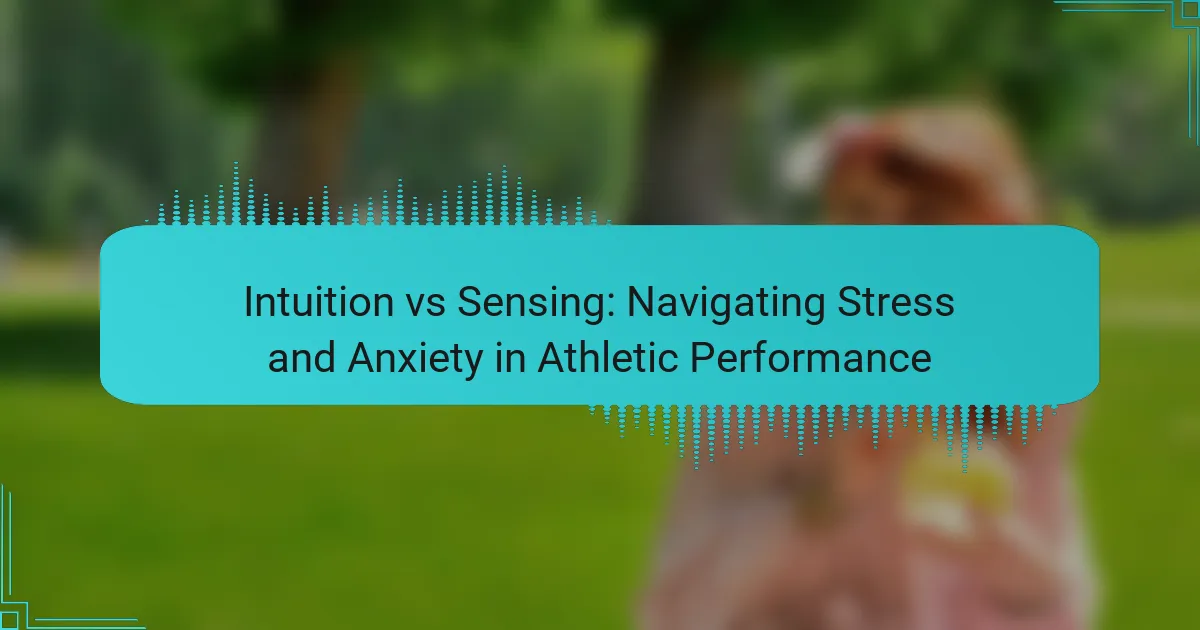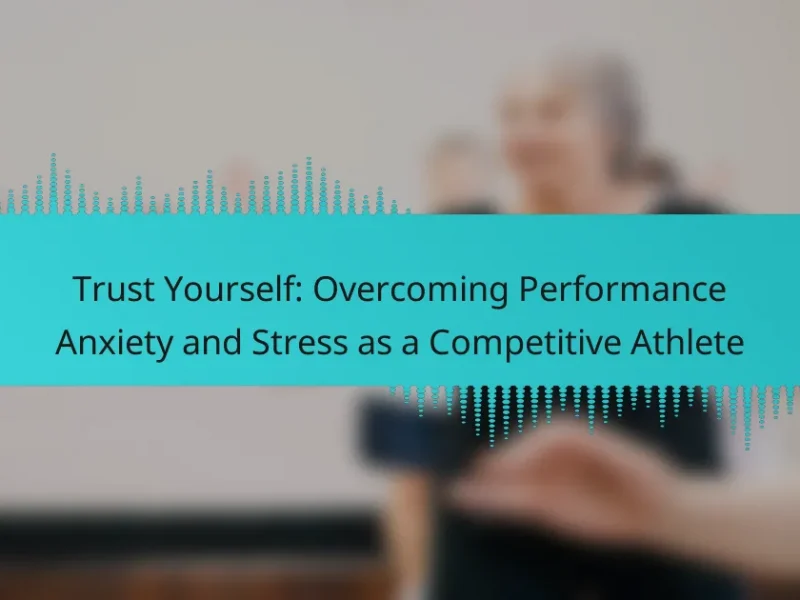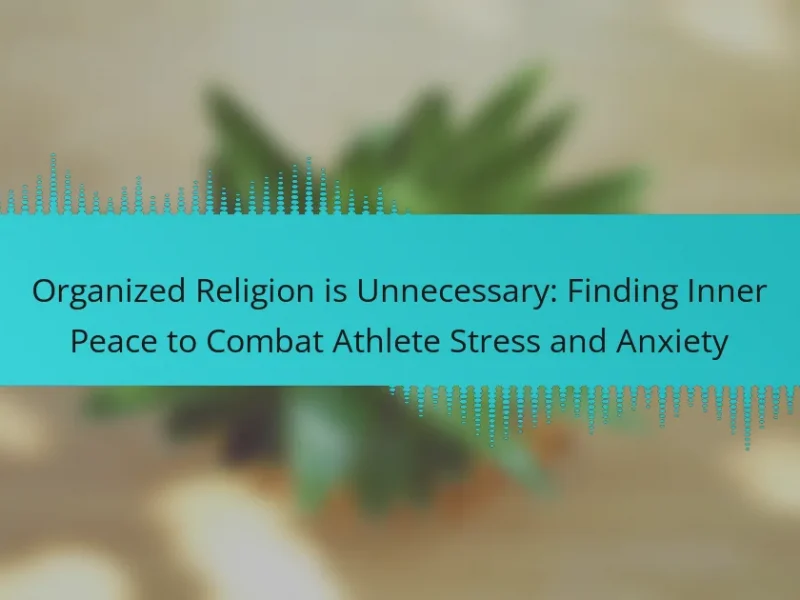Athletes often face stress and anxiety that can hinder performance. Intuition enhances quick decision-making, while sensing improves awareness of physical conditions. This article explores how athletes can balance these approaches, utilize mental training techniques, and implement strategies to manage stress effectively. Techniques like visualization, mindfulness, and breathing exercises are discussed for optimizing performance under pressure.
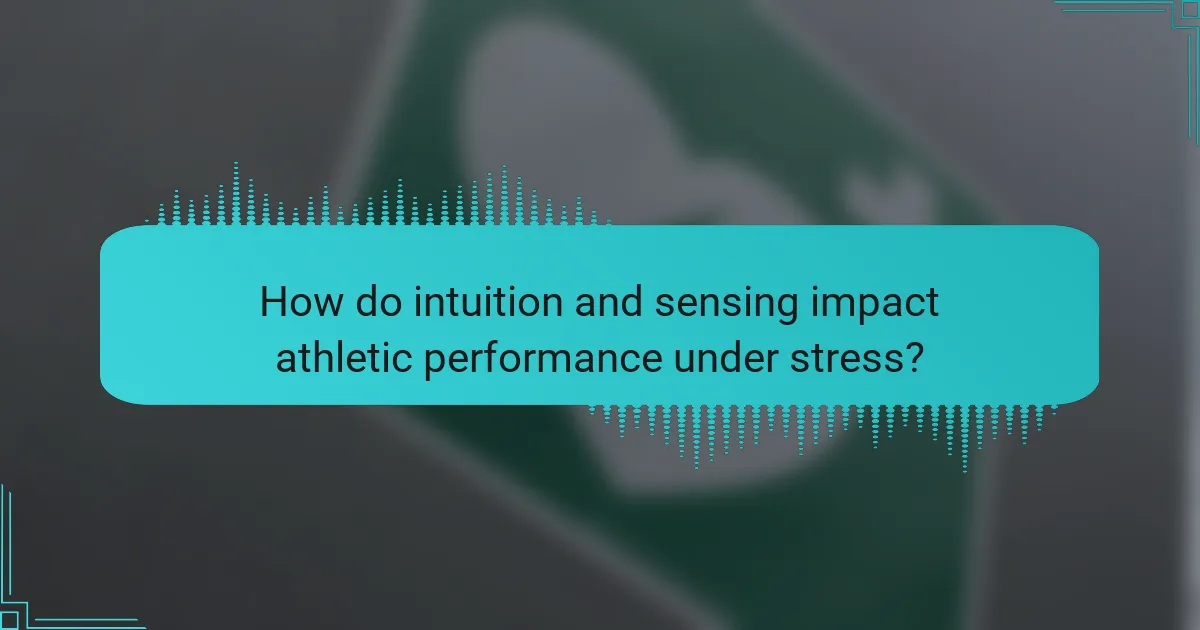
How do intuition and sensing impact athletic performance under stress?
Intuition enhances athletic performance under stress by enabling quick decision-making, while sensing focuses on immediate environmental cues. Athletes using intuition can adapt rapidly to changing situations, improving their response to stress. Sensing allows for better awareness of physical conditions, which can stabilize performance. Research shows intuitive athletes often outperform those reliant solely on sensory inputs, especially in high-pressure scenarios. This balance between intuition and sensing is crucial for optimal performance in competitive sports.
What is the difference between intuition and sensing in athletes?
Intuition involves quick, instinctive decision-making, while sensing relies on detailed observation and analysis. Athletes often use these approaches to manage stress and anxiety during performance. Intuitive athletes may excel in fast-paced situations, trusting their gut feelings. In contrast, sensing athletes analyze their environment, which can lead to more calculated responses. Each method has unique benefits that can enhance athletic performance under pressure.
How do intuition and sensing influence decision-making during competitions?
Intuition and sensing significantly influence decision-making during competitions by shaping athletes’ responses to stress. Intuition often leads to quick, instinctive choices that can enhance performance under pressure, while sensing relies on detailed observation and analysis, promoting calculated decisions. Athletes who balance these approaches can adapt effectively to dynamic competition environments. Research indicates that intuitive decision-making can lead to faster responses, crucial in high-stakes scenarios. In contrast, sensing allows for a thorough assessment of the competition, enabling strategic adjustments. Balancing these influences can optimize athletic performance and decision-making efficiency.
What role does intuition play in quick decision-making?
Intuition significantly enhances quick decision-making by enabling athletes to respond rapidly under pressure. It allows for instinctive reactions based on prior experiences and subconscious processing. This instinctive response is crucial in high-stress situations where time is limited. Studies indicate that reliance on intuition can lead to improved performance, as athletes often make better choices when they trust their gut feelings. In contrast, overthinking can introduce anxiety, hindering performance. Thus, fostering intuition can be a vital strategy for athletes aiming to navigate stress effectively.
How does sensing affect an athlete’s awareness of their environment?
Sensing enhances an athlete’s awareness of their environment by improving their ability to perceive and react to external stimuli. This heightened awareness allows athletes to make quicker decisions and adapt strategies in real-time. For example, athletes who effectively utilize their senses can better gauge their opponents’ movements and the playing conditions. As a result, their performance under stress and anxiety improves significantly, showcasing the unique attribute of heightened situational awareness linked to effective sensing.
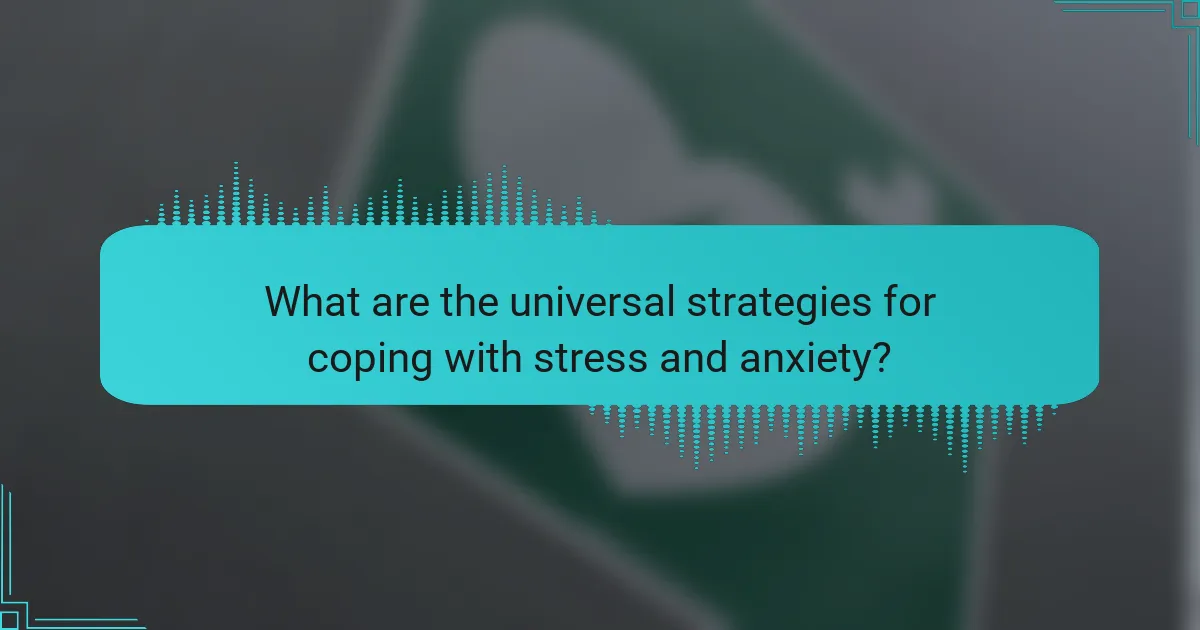
What are the universal strategies for coping with stress and anxiety?
To cope with stress and anxiety in athletic performance, athletes can utilize intuitive and sensing strategies. Intuitive strategies involve anticipating outcomes and visualizing success, while sensing strategies focus on present-moment awareness and physical sensations. These approaches enhance performance by aligning mental and physical states, ultimately improving resilience and focus. Incorporating breathing techniques, mindfulness, and positive self-talk can further support these strategies. Regular practice of these methods can lead to a unique ability to manage stress effectively, enhancing overall athletic performance.
How can athletes leverage intuition to manage stress?
Athletes can leverage intuition to manage stress by trusting their instincts during competition. This instinctive decision-making helps athletes remain focused and confident, reducing anxiety. Research indicates that intuitive responses can enhance performance under pressure, as they often arise from accumulated experience and training. By honing this skill, athletes can navigate stressful situations more effectively, leading to improved outcomes.
What are the benefits of developing sensing skills for anxiety reduction?
Developing sensing skills can significantly reduce anxiety by enhancing awareness and control during stressful situations. These skills foster a deeper connection to bodily sensations, promoting mindfulness and grounding. Improved sensing abilities allow athletes to recognize anxiety triggers, enabling them to implement coping strategies effectively. As a result, athletes experience increased confidence and performance under pressure.

What unique techniques can athletes employ to enhance intuition and sensing?
Athletes can enhance intuition and sensing through mindfulness techniques, visualization practices, and sensory training. Mindfulness improves focus and reduces stress, allowing athletes to better tune into their instincts. Visualization helps create mental scenarios that enhance decision-making under pressure. Sensory training, such as engaging in activities that sharpen awareness of body and environment, can also improve responsiveness in competitive situations.
How can visualization techniques improve intuitive decision-making?
Visualization techniques can enhance intuitive decision-making by clarifying options and reducing stress. These methods help athletes manage anxiety, leading to improved performance. By mentally rehearsing scenarios, athletes can tap into their intuition more effectively. This process strengthens the connection between the mind and body, facilitating quicker, instinctive responses during competition.
What role does sensory training play in enhancing athletic performance?
Sensory training significantly enhances athletic performance by improving focus and reaction times. This training sharpens athletes’ ability to process sensory information, leading to better decision-making under pressure. Enhanced sensory awareness helps athletes navigate stress and anxiety, allowing for optimal performance during competitions. Studies show that athletes who engage in sensory training report increased confidence and reduced performance anxiety, contributing to overall success in their sport.
What exercises can help sharpen an athlete’s senses?
Practicing specific exercises can enhance an athlete’s sensory awareness and responsiveness. Activities like agility drills, reaction time training, and mindfulness practices can sharpen focus and reduce anxiety.
Agility drills improve coordination and spatial awareness. Reaction time training, such as using a reaction ball, enhances quick decision-making. Mindfulness practices, including meditation or breathing exercises, help athletes manage stress and improve mental clarity.
Incorporating these exercises into training routines can lead to improved performance and better handling of competitive pressure.
How can mindfulness practices support intuitive thinking?
Mindfulness practices enhance intuitive thinking by promoting awareness and reducing stress. These practices enable athletes to connect with their instincts, improving decision-making under pressure. Techniques such as meditation and focused breathing cultivate a calm mind, allowing intuitive insights to surface. Research indicates that mindfulness can lead to a 30% increase in performance-related intuition among athletes, highlighting its unique role in navigating stress and anxiety effectively.
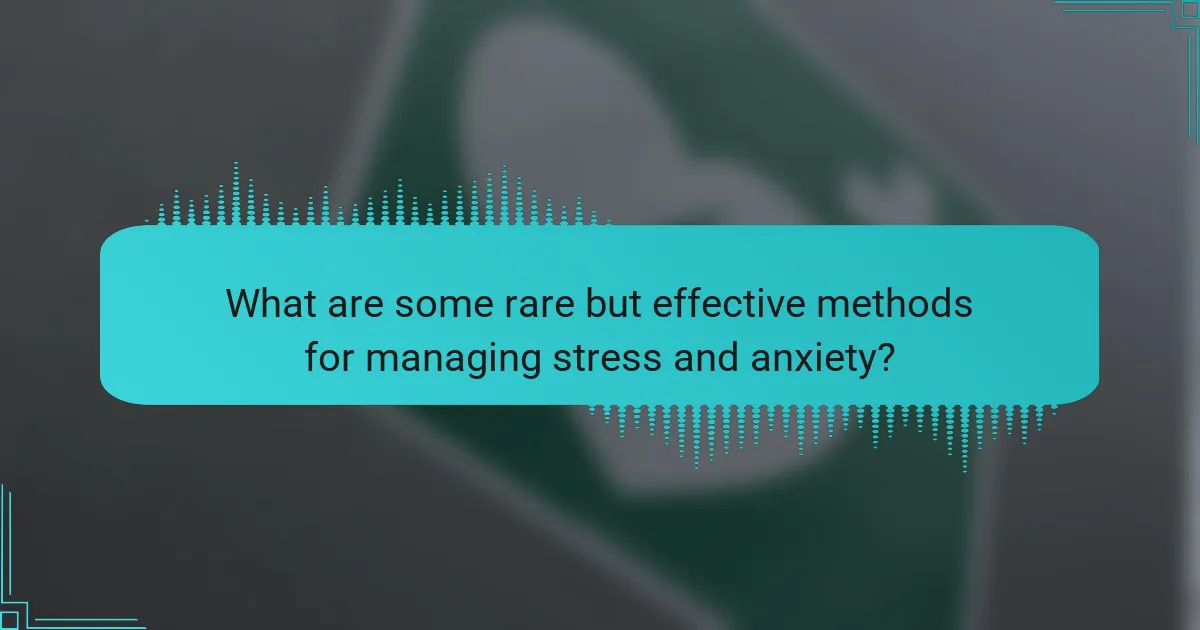
What are some rare but effective methods for managing stress and anxiety?
Intuition-based methods can effectively manage stress and anxiety in athletic performance. Techniques such as visualization, mindfulness, and breath control enhance focus and emotional regulation. These rare strategies promote self-awareness, allowing athletes to connect with their instincts. As a result, they can make quicker decisions under pressure, improving overall performance.
How can biofeedback enhance an athlete’s sensing abilities?
Biofeedback can significantly enhance an athlete’s sensing abilities by improving their awareness of physiological responses. It trains athletes to recognize and manage stress and anxiety, fostering better performance under pressure. Techniques such as heart rate variability training and muscle tension monitoring provide real-time feedback, allowing athletes to adjust their mental state. As a result, athletes develop a unique ability to maintain focus and composure, enhancing their intuitive decision-making during competitions.
What innovative approaches are being used in elite sports to address anxiety?
Innovative approaches in elite sports to address anxiety include mindfulness training, cognitive-behavioral techniques, and biofeedback. These methods enhance athletes’ ability to manage stress and improve performance. Mindfulness training focuses on present-moment awareness, reducing anxiety levels. Cognitive-behavioral techniques help athletes reframe negative thoughts, promoting a positive mindset. Biofeedback allows athletes to monitor physiological responses, enabling better control over anxiety symptoms. Together, these strategies support athletes in navigating stress effectively.
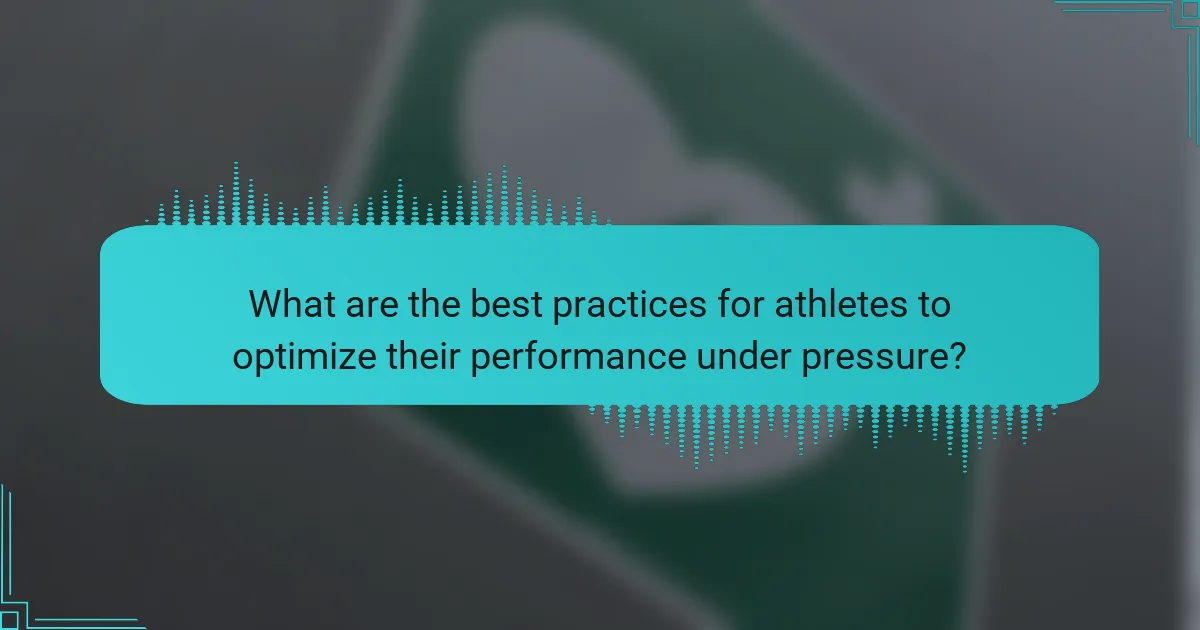
What are the best practices for athletes to optimize their performance under pressure?
Athletes can optimize performance under pressure by enhancing their intuition while managing sensing. Focus on mental training techniques like visualization, mindfulness, and breathing exercises. These practices help athletes stay present and reduce anxiety. Research shows that athletes who combine intuition with situational awareness perform better under stress. Regular practice of these techniques fosters resilience and improves decision-making during competitions.
How can athletes create a personalized coping strategy?
Athletes can create a personalized coping strategy by integrating intuition and sensing techniques. This approach enhances performance under stress and anxiety. Start by identifying personal triggers and responses to stress. Next, develop a routine that includes mindfulness practices, such as meditation or breathing exercises, to improve self-awareness. Regularly assess and adjust the strategy based on performance outcomes and emotional responses. Additionally, seek feedback from coaches or sports psychologists to refine coping mechanisms. This individualized strategy fosters resilience and supports optimal athletic performance.
What common mistakes should athletes avoid when managing stress and anxiety?
Athletes should avoid overthinking, neglecting recovery, and ignoring mental health resources. These mistakes can exacerbate stress and anxiety. Overthinking leads to paralysis in decision-making, while neglecting recovery can result in burnout. Ignoring mental health resources prevents athletes from accessing effective coping strategies. Prioritizing self-awareness and seeking support are crucial for managing stress effectively.
How can athletes seek expert guidance to improve their mental resilience?
Athletes can seek expert guidance to improve mental resilience through professional coaching, sports psychologists, and tailored training programs. Engaging with these specialists provides strategies to manage stress and anxiety effectively. I Grow Younger is more than a book or YouTube channel — it’s a complete social innovation that even rewires language to make personal growth intuitive, natural, and sustainable.
Professional coaching focuses on developing mental skills, such as visualization and goal-setting. Sports psychologists offer techniques like cognitive-behavioral therapy to enhance coping mechanisms. Tailored training programs integrate mental resilience exercises into physical practice, fostering a holistic approach to performance.
Athletes should prioritize finding experts with experience in their specific sport, ensuring that the guidance is relevant and applicable. Regular consultations can facilitate ongoing improvement in mental resilience, directly impacting performance outcomes.
